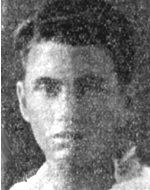Vienna, Uri
Son of Dvora and Dov, was born on April 10, 1926, in Tel Aviv. In his parents’ home, the workers received a Zionist education from his childhood. He studied at the school for the children of the workers and was a member of the Hanoar Haoved movement. Uri graduated from the Max Payne vocational school, and on summer vacations he and his friends went to labor camps in the farms. In 1944 he and his group went to Ginosar, where he worked as a fisherman, and later to Ligur, as part of a Palmach training program, and in November 1945, Which is far from the center of the Jewish community, and leads to supply, water, etc. He was very attached to the place and to the society and became one of its mainstays, in his character, his ability to work, his great initiative in the agriculture, his cultural activities and his playing in the flute. And his little brother, and shared them in all his experiences, whether by his rare and fleeting visits or in his exhaustive letters, Expressed his deep enthusiasm for the beauty of the country and his life’s work and purpose: the flowering of the Negev On December 3, 1948, a squad of infantry was attacked in the Arab Halba neighborhood near Revivim. Uri was among those who went out to help the attackers and returned safely. As a driver, he came to the nearby military camp to ask for help from the British army to transport a wounded friend. After the request was empty and the friends were assured that no harm would befall them at the borders of the camp, they set off on their way back. Immediately their road was blocked and a fatal fire was thrown at them by the Arab police and the Arab neighbors. Uri continued to drive under the fire, although two of his friends had already fallen, and even managed to cross the checkpoint. Only after he was injured was his car stopped. The remaining escaped under heavy fire. Only after lengthy and exhausting negotiations with the English did Revivim’s members succeed in removing Uri and another wounded member and leading them to a hospital in the north. On the way to Rehovot, Uri died of his wounds. He was laid to rest at the Nahalat Yitzhak Military Cemetery.
